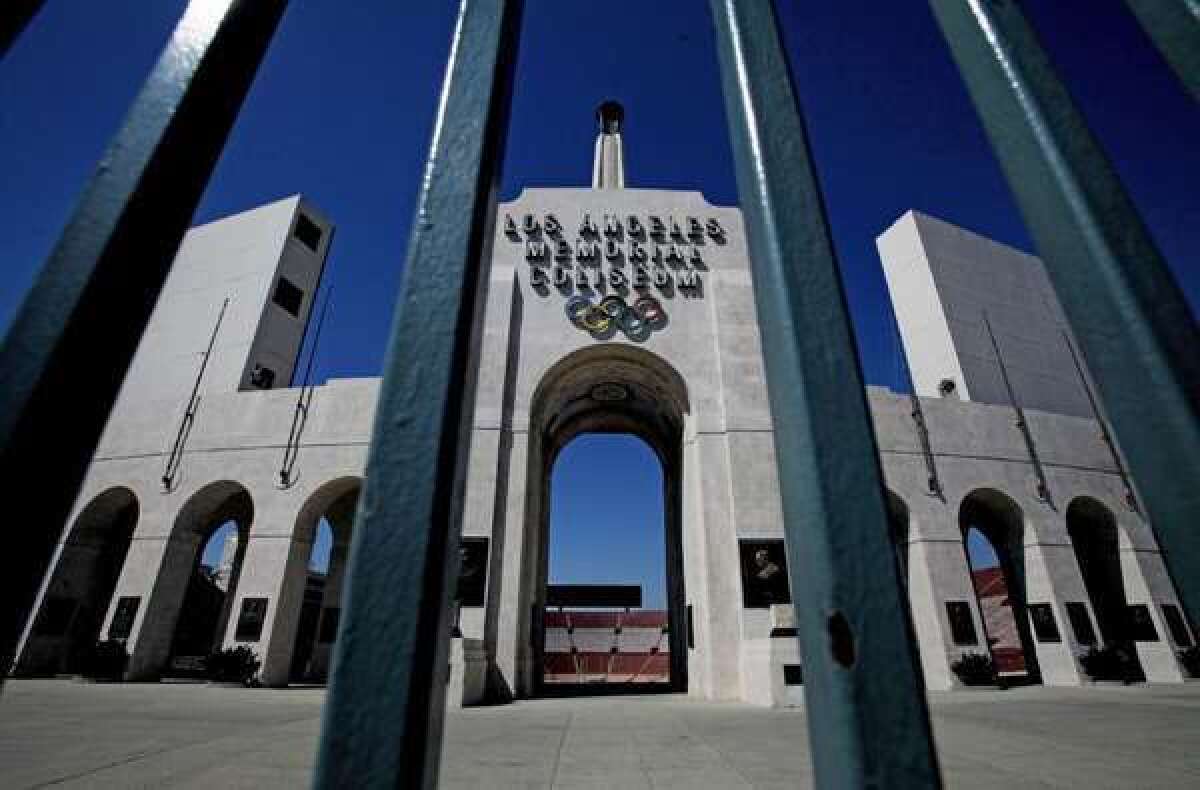Panel OKs Coliseum lease deal

- Share via
The Los Angeles Memorial Coliseum Commission, teetering on the brink of financial ruin, approved a controversial deal Monday to surrender day-to-day control of the historic venue to USC.
The 8-1 vote would virtually end public stewardship of the 88-year-old stadium, a jewel of its South Los Angeles neighborhood built to honor World War I veterans and financed with public money. USC has long sought control of the Coliseum, decrying the property’s outdated condition as unfit for the school’s Trojan football team, which plays there.
“We’re now in a position to restore this wonderful venue to its past glory,” said Tom Sayles, USC senior vice president for university relations.
The pact signals the failure of public officials to maintain the Coliseum as a self-sustaining venture. It follows a financial scandal that led to corruption charges against three former managers, two rave concert promoters and a former Coliseum contractor.
The new lease would give USC the right to control the facility until 2054, when the Coliseum Commission is set to dissolve and the assets are to be transferred to the state. The university wants the state to extend the lease through 2111.
USC would put $70 million into stadium upgrades under the deal, and take control of the Coliseum’s revenue. The university would also assume the $1-million annual rent payment to the state, which owns the land under the stadium and the companion Sports Arena. A state report in 2005 valued the complex at $240 million to $400 million.
Sports industry experts have said the lease gives USC all the benefits of owning the stadium without forcing it to buy the facility. Coliseum Commissioner Bernard C. Parks, an outspoken opponent of the lease and Monday’s lone “no” vote, said the deal fails to account for all the money taxpayers have spent building and repairing the facility since it opened in June 1923.
“Most of it is exclusively to benefit the university,” said Parks, who is also an L.A. City Councilman. “We should have negotiated this with more interest to the community, and in the interest of the taxpayers.”
The negotiations were surrounded by controversy. The Coliseum commissioners, a panel of nine representatives of Gov. Jerry Brown, the county Board of Supervisors and L.A. City Hall, talked over much of the deal in secret. Open-government advocates have said the opaque discussions could put the agreement in legal jeopardy because California law requires public deliberations.
The commission has also failed to comply with the California Public Records Act by not responding to requests for documents or delaying their release.
“This is an unloading of a huge public asset through a process entirely contemptuous of public involvement,” said Terry Francke, general counsel for Californians Aware, an open government group.
Commission attorneys say the panel has the right to deliberate in private to protect its negotiating position. Assistant County Counsel Thomas Faughnan has said the law entitles the panel to meet in closed session “to provide direction to its real property negotiators.”
Last week, the state ethics agency said it had opened an investigation into the Coliseum’s interim general manager, John Sandbrook, to determine if he illegally discussed a possible job with USC even as he held responsibility for negotiating a good deal for the public. Through a Coliseum lawyer, Sandbrook has denied the allegation, and USC officials have said they did not offer Sandbrook a job.
State officials have questioned whether the accord is the best one for taxpayers. In addition to seeking to lease the stadium for 99 years, USC wants control of six revenue-rich, state-owned parking lots that ring the Coliseum and a promise that officials will not try to renegotiate the lease if the stadium goes bankrupt.
An emissary of Brown, Secretary of the State and Consumer Services Agency Anna Caballero, said the state would not rubber-stamp the Coliseum panel agreement.
One concern she cited was control of the parking lots, used by patrons of the state’s free California Science Center museum and California African American Museum. Revenue from those lots help maintain Exposition Park, where the Coliseum and museums sit.
Sayles said he was confident the campus could work out an arrangement with the state. He would not say whether the three additional items USC wants were a potential deal breaker.
The Coliseum commission majority defended the deal Monday as the best chance to avoid insolvency. They said they were hampered by their own agreement with USC in 2008 to pay for repairs that now they cannot afford.
“I believe our community deserves a first-rate facility, and it’s clear to me that the University of Southern California has the wherewithal to achieve that objective,” said Supervisor Mark Ridley-Thomas.
“It’s naive to believe that the Coliseum commission can continue to operate a facility of this complexity,” said Commissioner Glenn Sonnenberg, an appointee of the governor who was nominated by USC and is a former member of the university’s board of trustees.
Sonnenberg also argued that the Coliseum actually had “negative value” because it required so much remedial work.
The Coliseum is so strapped -- its reserves are expected to dwindle from $2.3 million to $15,375 between the end of May and the end of June -- that the panel voted to mortgage the iconic stadium sign near the 110 Freeway to USC for up to $1.5 million.
If the Coliseum cannot repay the loan in 10 years, USC would be able to seize the sign.
--
Times staff writer Paul Pringle contributed to this report.
More to Read
Sign up for Essential California
The most important California stories and recommendations in your inbox every morning.
You may occasionally receive promotional content from the Los Angeles Times.











